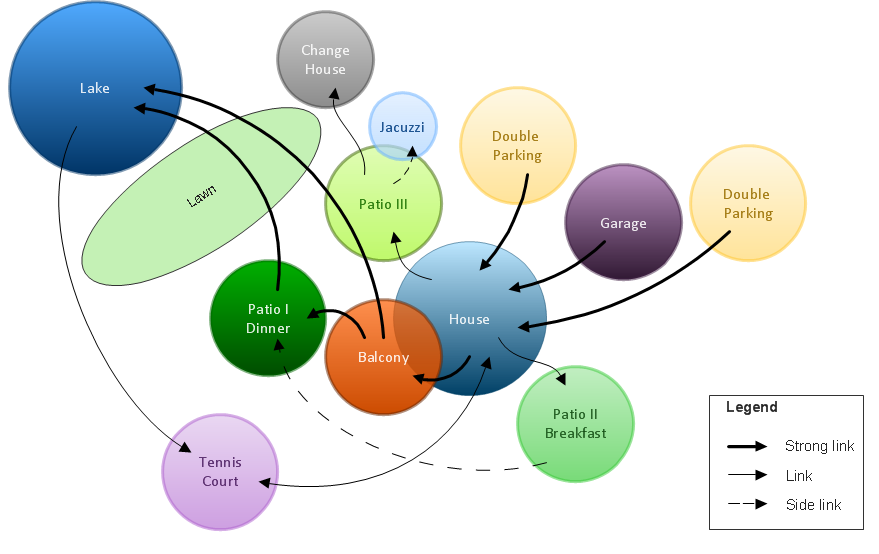 Block Diagrams
Block Diagrams
Block diagrams solution extends ConceptDraw DIAGRAM software with templates, samples and libraries of vector stencils for drawing the block diagrams.
Bubble diagrams in Landscape Design with ConceptDraw DIAGRAM
Bubble Diagrams are the charts with a bubble presentation of data with obligatory consideration of bubble's sizes. They are analogs of Mind Maps and find their application at many fields, and even in landscape design. At this case the bubbles are applied to illustrate the arrangement of different areas of future landscape design, such as lawns, flowerbeds, playgrounds, pools, recreation areas, etc. Bubble Diagram helps to see instantly the whole project, it is easy for design and quite informative, in most cases it reflects all needed information. Often Bubble Diagram is used as a draft for the future landscape project, on the first stage of its design, and in case of approval of chosen design concept is created advanced detailed landscape plan with specification of plants and used materials. Creation of Bubble Diagrams for landscape in ConceptDraw DIAGRAM software is an easy task thanks to the Bubble Diagrams solution from "Diagrams" area. You can use the ready scanned location plan as the base or create it easy using the special ConceptDraw libraries and templates.
 Interactive Voice Response Diagrams
Interactive Voice Response Diagrams
Interactive Voice Response Diagrams solution extends ConceptDraw DIAGRAM software with samples, templates and libraries of ready-to-use vector stencils that help create Interactive Voice Response (IVR) diagrams illustrating in details a work of interactive voice response system, the IVR system’s logical and physical structure, Voice-over-Internet Protocol (VoIP) diagrams, and Action VoIP diagrams with representing voice actions on them, to visualize how the computers interact with callers through voice recognition and dual-tone multi-frequency signaling (DTMF) keypad inputs.
- Basic Service Operation In Workflow Auto Shop
- Auto Repair Shop Efficient Floor Plans
- Types of Flowchart - Overview | Auto Loan Process Flow Chart
- Process Flowchart | Entity-Relationship Diagram (ERD) | Activity ...
- Process Flowchart | Basic Flowchart Symbols and Meaning | Types ...
- Work Flow Chart Of Automotive Servicing Operation Manegement
- Bank Auto Loan Application Visio Diagram
- Automotive Shop Layout
- Cool Auto Shop Floor Plans
- Automotive Work Flow Chart Pdf
- Network Diagramming Software for Network Active Directory Diagrams
- Sales Process Flowchart . Flowchart Examples | Sales Process ...
- Car Servuce Process Flowchart
- Process Flowchart | Event-Driven Process Chain Diagram Software ...
- Automotive Repair Shop Floor Plans
- Process Flowchart | Engineering | Data Flow Diagrams (DFD) | Flow ...
- Automotive Repair Shop Building Plans
- UML Class Diagram Example - Medical Shop | IDEF3 Standard ...
- Block diagram - Automotive HVAC system | Create Block Diagram ...
- How To Draw Flowchart For Online Shopping Site
